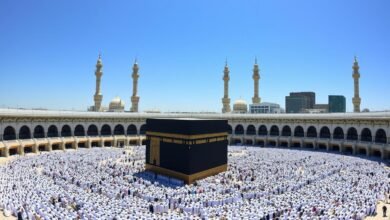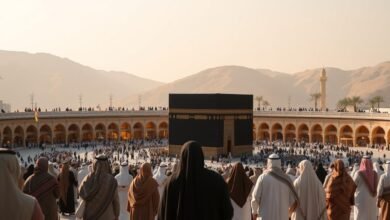Saudi Arabia’s Role in Islamic History and Heritage
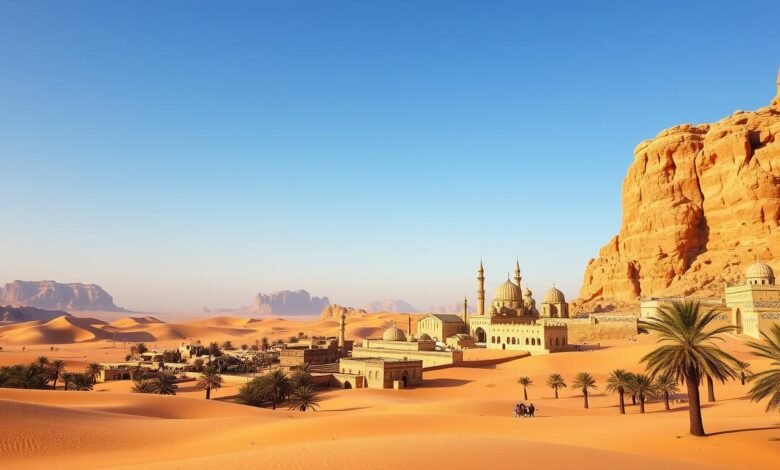
Saudi Arabia is where Islam began, making its impact on the Muslim world huge. But have you thought about how deep the kingdom’s role is in Islamic history and keeping its sacred heritage alive? We’ll explore how Saudi Arabia has deeply influenced the Islamic world’s religious and cultural scenes.
Why is the Arabian Peninsula so key to Islamic faith and traditions? Let’s dive into the fascinating story of Saudi Arabia’s dedication to protecting the Prophet Muhammad’s legacy. We’ll also look at the lasting impact of Mecca and Medina, the holy cities.
Understanding the Role of Saudi Arabia in Islamic History and Heritage
Saudi Arabia is the birthplace of Islam and the home of the Two Holy Mosques. It plays a deep and complex role in the Muslim world’s history and culture. The Arabian Peninsula, where Mecca and Medina are, has been at the heart of Islamic civilization for ages. It has shaped the faith and traditions of billions of Muslims worldwide.
Historical Significance of the Arabian Peninsula
The Arabian Peninsula is known as the cradle of Islam. It’s where the Prophet Muhammad received revelations that became the Quran. This area saw Islam emerge and spread globally, changing human history. Mecca and Medina, in Saudi Arabia, are the spiritual and geographical centers of Islam for generations.
Cultural Impact on Islamic Civilization
Saudi Arabia has greatly influenced Islamic culture and knowledge. As the custodian of the Two Holy Mosques, it preserves Islamic traditions and practices. From the Hajj pilgrimage to Islamic literature and scholarship, Saudi Arabia’s impact on Muslims worldwide is unmatched.
Saudi Arabia’s Position in Modern Islam
In today’s world, Saudi Arabia’s role as the custodian of the Two Holy Mosques is even more important. The Kingdom works to keep the holy sites in good condition, supports pilgrimages, and promotes Islamic education. This has made Saudi Arabia a leading voice and guide for Muslims globally.
| Significance | Description |
|---|---|
| Mecca and Medina | The holy cities of Mecca and Medina, located within Saudi Arabia, are the most sacred sites in Islam, hosting the Kaaba and the Prophet Muhammad’s mosque, respectively. |
| Custodian of the Two Holy Mosques | Saudi Arabia is responsible for the management, preservation, and development of the Al-Masjid Al-Haram in Mecca and the Al-Masjid An-Nabawi in Medina, the two most important mosques in the Islamic world. |
| Historical and Cultural Significance | The Arabian Peninsula, particularly Saudi Arabia, is the birthplace of Islam and has been the center of Islamic civilization for centuries, shaping the faith, traditions, and practices of Muslims globally. |
The Birth of Islam: Mecca and Medina’s Sacred Legacy
Mecca and Medina are deeply loved by Muslims everywhere. These cities are where Islam was born. They are the most sacred places for Muslims to visit. Learning about their history and importance helps us understand Islam’s roots and growth.
Mecca is where the Prophet Muhammad was born and got his first revelations. The Kaaba, a special building, is in Mecca. It’s the center of prayer for all Muslims. People from all over come to Mecca for the Hajj, a key Islamic ritual.
Medina is where the Prophet Muhammad started the first Islamic community. It’s also where he is buried. Medina is a major place for learning and scholarship. The Prophet’s Mosque, Al-Masjid An-Nabawi, is a famous site that many visit each year.
| Mecca | Medina |
|---|---|
| Birthplace of Prophet Muhammad | Established the first Islamic community |
| Home to the Kaaba, the focal point of Islam | Resting place of Prophet Muhammad’s tomb |
| Site of the annual Hajj pilgrimage | Center of Islamic learning and scholarship |
The legacy of Mecca and Medina is huge. They are the mecca and medina, islamic pilgrimage sites, and the birthplace of islam. These cities are very important to Muslims. They remind us of Islam’s rich history and traditions.
The Two Holy Mosques: Guardianship and Development
Saudi Arabia is the custodian of the two holy mosques. It has a big role in keeping Islamic traditions alive. The kingdom works hard to keep Al-Masjid Al-Haram in Mecca and Al-Masjid An-Nabawi in Medina grand. This has earned it great respect from Muslims everywhere.
Al-Masjid Al-Haram in Mecca
The Al-Masjid Al-Haram, or Sacred Mosque, is the most sacred place in Islam. It has the Kaaba, where Muslims pray. Saudi Arabia has done a lot to make this place bigger for more pilgrims.
Al-Masjid An-Nabawi in Medina
The Al-Masjid An-Nabawi, or Prophet’s Mosque, is very important too. It’s where the Prophet Muhammad is buried. Saudi Arabia has spent a lot to keep this mosque beautiful and meaningful.
Modern Expansion and Preservation Efforts
Recently, Saudi Arabia has worked on the two holy mosques. It has built new parts and added modern facilities. This makes sure pilgrims are safe and comfortable.
Saudi Arabia is dedicated to taking care of the two holy mosques. It helps keep Islamic traditions alive. And it makes sure these special places are open to Muslims from everywhere.
Saudi Arabia’s Role in Preserving Islamic Heritage Sites
Saudi Arabia is a key player in keeping Islamic heritage sites safe. It has launched many projects to protect these important places. This ensures they keep inspiring and teaching people everywhere.
The kingdom focuses a lot on saving archaeological sites. It has worked hard to fix up ancient cities and sacred shrines. By using new conservation methods and working with local people, Saudi Arabia has kept these sites in great shape. Now, visitors can dive into Islamic history.
Saudi Arabia also leads in protecting the Arabian Peninsula’s architecture. It has done big restoration jobs on old buildings, mosques, and other key structures. These efforts keep the buildings standing and the traditions alive.
Moreover, Saudi Arabia has worked hard to document and list Islamic heritage sites. It has teamed up with global groups and schools to gather lots of information. This helps us understand the Arabian Peninsula’s history better.
By sticking to its goal of saving Islamic traditions, Saudi Arabia is crucial in protecting the Arabian Peninsula’s history. Its efforts to restore and protect these sites honor its own history. They also help people around the world appreciate Islamic culture.
The Kingdom’s Contribution to Islamic Education and Scholarship
Saudi Arabia has always been a leader in Islamic knowledge and leadership worldwide. It has a vast network of Islamic universities, research centers, and publishing projects. These efforts help spread Islamic knowledge and keep Islamic traditions alive.
Islamic Universities and Research Centers
In Saudi Arabia, you’ll find top Islamic universities and research centers. Places like the Imam Muhammad ibn Saud Islamic University and the King Saud University are known for their work. They offer programs in Quranic studies and Islamic jurisprudence, drawing students from all over.
Publishing and Distribution of Islamic Literature
Saudi Arabia is also a key player in publishing Islamic literature. Its publishing houses, like the King Fahd Complex for the Printing of the Holy Quran, are crucial. They produce and share Islamic texts, including the Quran, to Muslims everywhere, helping preserve Islamic knowledge.
Supporting Global Islamic Studies
Saudi Arabia’s support for Islamic education and scholarship goes beyond its borders. It backs Islamic studies programs and research globally. Through funding, academic partnerships, and knowledge-sharing, Saudi Arabia boosts the global understanding of Islamic heritage. This solidifies its role as a leader in the Muslim world.
By investing in Islamic education, publishing, and outreach, Saudi Arabia shows its strong commitment. It aims to spread Islamic knowledge, support global Muslim leadership, and preserve Islamic traditions for future generations.
Hajj Management: Organizing the World’s Largest Religious Gathering
Saudi Arabia is key in managing the Hajj pilgrimage, the biggest religious event. It happens every year in Mecca and Medina. Millions of Muslims come from all over to visit these sacred places.
Planning the Hajj is a huge task for the Saudi government. They handle everything from where people stay to making sure they are safe. Their work makes the pilgrimage meaningful for all who go.
The Saudi authorities work hard to meet the needs of Hajj visitors. They manage crowds, improve health care, and update facilities. This helps more people to join the pilgrimage each year.
Saudi Arabia’s efforts keep the holy mosques open to Muslims worldwide. This lets them fulfill their religious duties and connect with Mecca and Medina.
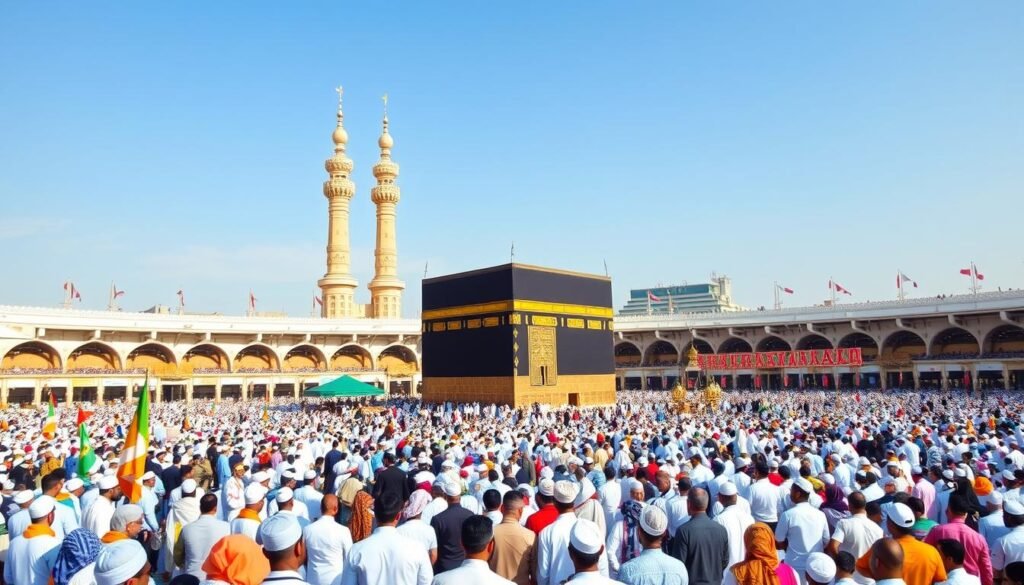
The kingdom’s hard work in organizing the Hajj has helped millions on their spiritual journey. It has also made Saudi Arabia a leader in managing religious events. They keep the holy mosques accessible and sacred for all.
Saudi Arabia’s Influence on Contemporary Islamic Architecture
Saudi Arabia has been key in shaping Islamic architecture today. It’s dedicated to keeping Islamic traditions alive. This dedication has led to many architectural wonders.
Blending Traditional and Modern Design Elements
In Saudi Arabia, old and new meet in architecture. Architects mix ancient calligraphy and geometric patterns with modern tech. They use stone and wood to honor the Arabian Peninsula’s heritage.
These buildings also show the kingdom’s care for the environment. They use the latest in sustainable design.
Preservation of Historical Islamic Buildings
Saudi Arabia works hard to keep its old buildings safe. It’s restoring many historical sites. This ensures these buildings remain symbols of the region’s culture and faith.
Places like Al-Masjid Al-Haram in Mecca and Al-Masjid An-Nabawi in Medina are well-kept. They’re open for all to visit and be inspired.
Saudi Arabia’s mix of old and new in architecture makes it a leader. Its work inspires people all over the world. It shows the beauty of Islamic architecture.
The Kingdom’s Role in Islamic Diplomacy and Unity
Saudi Arabia is the guardian of Islam’s two holiest sites. It has a key role in Muslim leadership and spreading Islamic knowledge. The kingdom works hard to unite and understand the Islamic world.
Saudi Arabia helps solve conflicts between Muslim nations. It acts as a neutral middleman, helping factions find peace. This keeps the unity of the Muslim community strong and protects Islam’s shared heritage.
The kingdom also leads in sharing Islamic knowledge globally. It supports Islamic universities and research centers. These places spread important Islamic texts, strengthening Muslim bonds worldwide.
Saudi Arabia also fights for Muslim interests globally. It talks to international groups, pushing for Islamic values and traditions. This raises the Muslim world‘s profile and makes sure Muslim voices are heard.
By focusing on Islamic diplomacy and unity, Saudi Arabia has become a global Muslim leader. It promotes cooperation and understanding among Muslims.
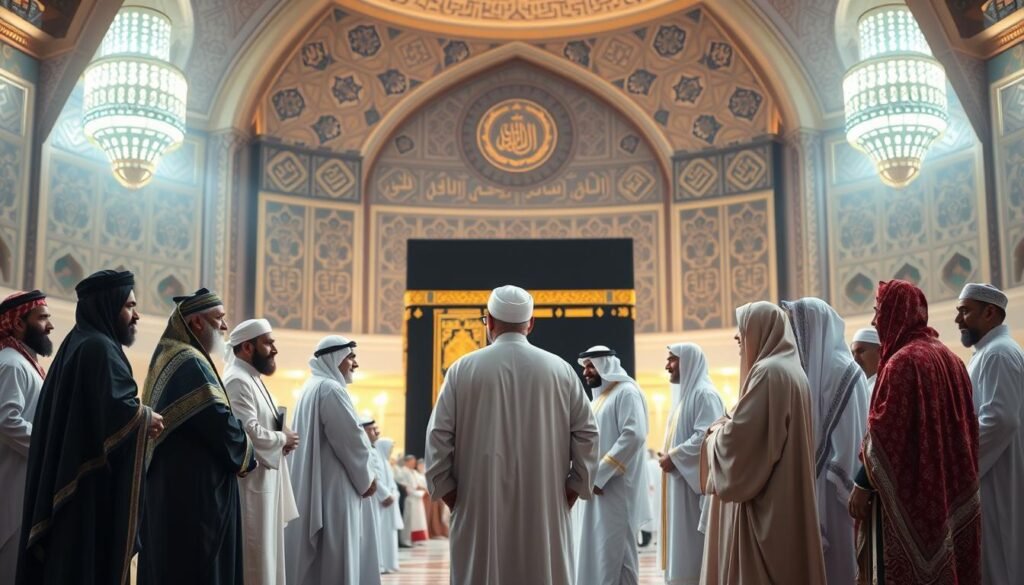
Cultural Preservation Initiatives and Islamic Museums
Saudi Arabia is the guardian of Islam’s most sacred places. It has made great efforts to keep and share the Islamic world’s rich culture. The kingdom has built modern museums and cultural centers. These places teach both locals and visitors about Islamic traditions.
The King Abdulaziz Center for World Culture is a prime example. It’s a large complex with many exhibits and interactive displays. It explores the history and growth of Islamic civilization. Visitors can see rare items and enjoy multimedia shows, learning about Islam’s lasting impact.
Saudi Arabia also has regional museums that show the unique cultures of Islamic communities. The Makkah Museum, for example, shows the rituals and traditions of pilgrims. By saving these cultural treasures, Saudi Arabia makes sure Islam’s spirit lives on for future generations.
FAQ
What is the historical significance of the Arabian Peninsula in the context of Islamic history and heritage?
The Arabian Peninsula is key in Islamic history. It’s where Islam started, with Mecca and Medina being crucial. These places are where the Prophet Muhammad got the messages that shaped Islam. The Peninsula’s rich history has greatly influenced Islamic culture and civilization.
How has Saudi Arabia’s role as the custodian of the Two Holy Mosques impacted the Muslim world?
Saudi Arabia’s role as the custodian of the Two Holy Mosques is vital. It helps keep Islamic traditions alive and makes the Hajj pilgrimage possible. The kingdom works hard to improve these sacred sites, making them welcoming to millions of Muslims. This strengthens their spiritual bond with Islam’s origins.
What are some of the key cultural and architectural contributions of Saudi Arabia to the Islamic world?
Saudi Arabia has greatly contributed to Islamic architecture and culture. It combines old and new designs in its buildings, showing Islamic beauty’s lasting impact. The kingdom also works to save old Islamic sites and teach about Islamic culture through museums and schools.
How has Saudi Arabia contributed to the spread of Islamic knowledge and scholarship globally?
Saudi Arabia has been a big help in spreading Islamic knowledge. It has set up top Islamic universities and research centers. These places focus on Islamic studies, theology, and history. Saudi Arabia also helps publish and share Islamic books, spreading knowledge and keeping traditions alive worldwide.
What is Saudi Arabia’s role in Islamic diplomacy and promoting unity among Muslim nations?
Saudi Arabia is a key player in Islamic diplomacy. It works hard to bring Muslim countries together. The kingdom helps solve conflicts and speaks for the Muslim world globally. Its efforts help keep the Muslim community united and strong.


